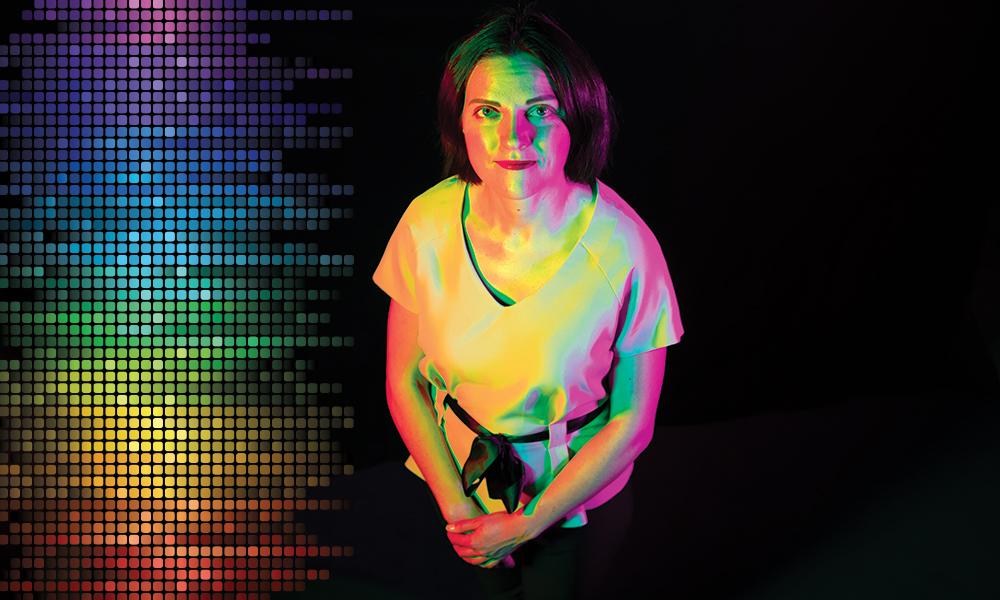International Ph.D. student making her mark on Madison
Featured Stories
SUMMARY: During her time at JMU, doctoral candidate Tatjana Titareva has presented with the Center for Faculty Innovation on issues of diversity, equity and inclusion, and worked with JMU X-Labs, the Gilliam Center for Entrepreneurship, Women for Madison and the university’s Quality Enhancement Plan working group. In 2022, she was named a Stanford University Innovation Fellow. Her dissertation is on the use of artificial intelligence in higher education administration.
In the summer of 2018, Tatjana Titareva was presenting a paper on the internationalization of higher education in Europe at a conference in Valencia, Spain. Her colleague didn’t want to attend the official dinner and handed Titareva his ticket. As she entered the futuristic City of Arts and Sciences complex on the outskirts of Valencia and approached one of the tables, she noticed four people smiling at her.
“Where I come from, it’s considered a little funny for people to smile at you when they don’t know you,” said Titareva, then the head of a business school, international project manager and lecturer from Latvia. “But they acted like they knew me. They were asking, ‘How are you?’ I knew I should be polite and respond.”
The greeting was the start of a three-hour conversation with JMU staff members, with both sides exchanging facts and stories about the differences in education in the U.S. and Europe. Near midnight, one of the JMU delegates who was also a doctoral student in Strategic Leadership Studies, mentioned that they would like to have a person with Titareva’s background and experience in the program.
A mid-career professional with an undergraduate degree in Business Administration and two master’s degrees — one in Public Administration and the other in Political Science — Titareva politely took their contact information but had no plans to follow up. However, six months later, when she mentioned the conversation to a German colleague, he said, “You are a FOOL if you do not consider pursuing an opportunity in an American university!”
Titareva was intrigued by the prospect of pursuing a doctorate full-time in the U.S. She got in touch with a JMU representative who gave her the name of a contact in Spain. The person responded immediately and connected her to the faculty of JMU’s Strategic Leadership Studies program. The team members made themselves available to her throughout the application process and helped to overcome challenges before and after landing in Harrisonburg, Virginia, in the summer of 2020.
Two and a half years later, despite having to adjust to a new country and a host institution with a unique culture amid a global pandemic, Titareva, 37, is making her mark on Madison.
Her research area, and the subject of her dissertation, is artificial intelligence in higher education administration. Titareva has written extensively on the topic and co-authored a paper with her faculty adviser, Benjamin Selznick, that introduces a framework for ethical discourse on the subject. It concludes that while AI technologies present opportunities for advancement in learning quality, administrative decision-making and optimizing infrastructure, higher ed remains, at its core, a human endeavor, and administrators must drive decisions about AI technologies rather than allow AI technologies to drive the decisions of administrators.
“Let’s get the various stakeholders — leadership, faculty, students, their parents — together around the table and start discussing this now,” Titareva said. “It’s important that we put in place policies and ethical standards for these technologies before they become widespread in higher education.”Last summer, Titareva furthered her research during an externship in Paris with the Organization for Economic Co-operation and Development, whose goal is to shape policies that promote prosperity, equality, opportunity and well-being among its member nations around the world. Her OECD colleagues were mostly doctorates from Yale, Princeton, the London School of Economics, Cambridge and other prestigious schools in the U.S., U.K. and France.
“To work there with them was one of the main reasons I wanted to get a Ph.D.,” she said. “This is the level I’ve been striving for for years!”
Margaret Sloan, director of the School of Strategic Leadership Studies, said Titareva’s externship “demonstrates SSLS’s rising prominence among national and international organizational leaders and exemplifies our small program-high impact approach.”
During her time at JMU, Titareva has also presented with the Center for Faculty Innovation on issues of diversity, equity and inclusion, and worked with JMU X-Labs, the Gilliam Center for Entrepreneurship, Women for Madison and the university’s Quality Enhancement Plan working group. In 2022, she was named a Stanford University Innovation Fellow.
For Titareva, a doctorate isn’t just about the three letters after your name but the skills that you develop. “You have to think differently. You have to understand macro trends — global processes, climate change, political interests — and how they relate to your field of study. These are 21st-century leadership skills.”
Selznick, who studies how colleges and universities develop student innovators in higher education, said working with Titareva has been rewarding.
“Her global experiences and professional background provide a unique foundation for developing new ideas and considering research from a multidisciplinary perspective,” Selznick said. “Collaborating on an article and advising on her dissertation have also helped me to more fully understand some of the distinctive dimensions of using artificial intelligence in higher education, a topic that will only become increasingly more important in the coming decade.”

